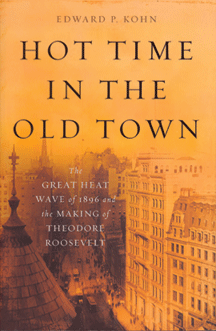Book Review
Hot Time in the Old Town. By Edward Kohn. Basic Books, 2010.
BY KATE SAMPSELL-WİLLMANN Bilkent News
 Assistant Professor Edward Kohn, acting chair of the Department of American Culture and Literature (AMER) and faculty member in the History Department (HIST), recently published a book titled Hot Time in the Old Town: The Great Heat Wave of 1896 and the Making of Theodore Roosevelt (Basic Books, 2010). Hot Time, Kohn's second book, has received quite a bit of attention in the U.S. media (and rightly so).
Assistant Professor Edward Kohn, acting chair of the Department of American Culture and Literature (AMER) and faculty member in the History Department (HIST), recently published a book titled Hot Time in the Old Town: The Great Heat Wave of 1896 and the Making of Theodore Roosevelt (Basic Books, 2010). Hot Time, Kohn's second book, has received quite a bit of attention in the U.S. media (and rightly so).
The book's title comes from an 1896 minstrel song, "Hot Time in the Old Town Tonight," about going out on the town with friends, but Kohn has cleverly shortened the title to discuss a seemingly forgotten but severe heat wave that ravaged 1896 New York and, according to Kohn, launched the national political career of NYPD Police Commissioner Theodore Roosevelt. Roosevelt (1858-1919) went on to become the 26th president of the U.S.
Political historians have tended to pass over the non-political influences that propel people into national politics. Kohn rectifies that omission with this well-written narrative telling of how a local disaster can have long-term national consequences, and especially how an environmental catastrophe that cost thousands of lives lifted a charismatic local police chief to the national stage.
For ten days in August, 1896, temperatures and humidity in New York City soared. Temperatures never fell below 21 (70 in Fahrenheit) and daily reached into the mid-30s. Although that might not seem so hot living in Anatolia, the very high humidity (often 90 percent and above in August) of East Coast summers amplifies the discomfort and even the danger of high heat.
Living conditions for new immigrants and the poor in 1896 New York were over-crowded and lacked sanitation, ventilation, and sometimes running water. The U.S. economy had been in a period of severe depression, and millions were out of work. Compounded by continued high levels of immigration, when the heat came, it took thousands of lives from New York's cramped, draft-less tenements. Cholera, and its handmaiden dehydration, was the culprit. The ethic of the age generally kept government from interceding to create decent living conditions and to protect public health. In fact, these concepts derive from the same period in history. Because a heat wave, like drought, does not generate images of spectacular damage - Hurricane Katrina comes to mind - deaths and misery can pile up in alarming numbers before action is taken.
Kohn's book observes a curious connection between New York's woe and a national event: "The same week of the heat wave witnessed the start of the 1896 presidential campaign" (xii). Although the candidate who eventually won, William McKinley, stayed at home in Ohio, much of the drama of the campaign played out in New York, at that time the state with the most electoral college votes. Remembering what happened in the Al Gore/George W. Bush election of 2000, the electoral college is upmost in any candidate's mind.
Kohn thereby sets the stage for fascinating and well-researched tale about the impact of the needs of the local and disfranchised poor on national, even world, events. Kohn reminds historians that sometimes the best part of studying the past is listening for the narrative and resurrecting the stories of the obscure, the powerless, and the forgotten.
Kohn has been a member of the Bilkent faculty since 2003, when he earned his Ph.D. in history from McGill University in Montreal. He identifies himself as a scholar of Theodore Roosevelt but publishes in the wider 1880-1920 period known as the Gilded Age and Progressive Era.
Hot Time in the Old Town attracted much attention last month in the U.S., where it was reviewed in Publisher's Weekly, Library Journal, Kirkus Reviews, and The Wall Street Journal. According to the WSJ: Hot Time is "an engrossing account of this forgotten episode…. Mr. Kohn does a wonderful job of explaining how a heat wave could produce a calamity for a city and a personal disaster for a presidential candidate…. [A] hell of a story."
In addition to print media, Kohn gave interviews on the radio program Fresh Air, broadcast on National Public Radio (NPR), and to Jon Stewart on The Daily Show. When asked about his recent trip to the States to talk about Hot Time, Kohn replied: "Appearing on The Daily Show was without doubt the highlight of my career so far. Jon Stewart and his staff worked very hard to make me feel comfortable. I also appreciated the fact that Jon Stewart was very familiar both with the book and with American history."